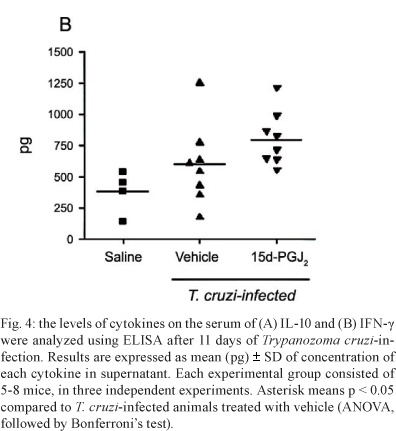The acute phase of Trypanosoma cruzi infection is associated with a strong inflammatory reaction in the heart characterised by a massive infiltration of immune cells that is dependent on the T. cruzi strain and the host response. 15d-PGJ2 belongs to a new class of anti-inflammatory compounds with possible clinical applications. We evaluated the effects of 15d-PGJ2 administered during the acute phase of T. cruzi infection in mice. Mice were infected with the Colombian strain of T. cruzi and subsequently treated with 15d-PGJ2 repeatedly for seven days. The inflammatory infiltrate was examined by histologic analysis. Slides were immunohistochemically stained to count the number and the relative size of parasite nests. Infection-induced changes in serum cytokine levels were measured by ELISA. The results demonstrated that treatment with 15d-PGJ2 reduced the inflammatory infiltrate in the skeletal muscle at the site of infection and decreased the number of lymphocytes and neutrophils in the blood. In addition, we found that 15d-PGJ2 led to a decrease in the relative volume density of amastigote nests in cardiac muscle. T. cruzi-infected animals treated with 15d-PGJ2 displayed a statistically significant increase in IL-10 levels with no change in IFN-γ levels. Taken together, we demonstrate that treatment with 15d-PGJ2 in the acute phase of Chagas disease led to a controlled immune response with decreased numbers of amastigote nests, as measured by the volume density.
Chagas disease; Trypanosoma cruzi; 15d-PGJ2; PPAR-gamma






